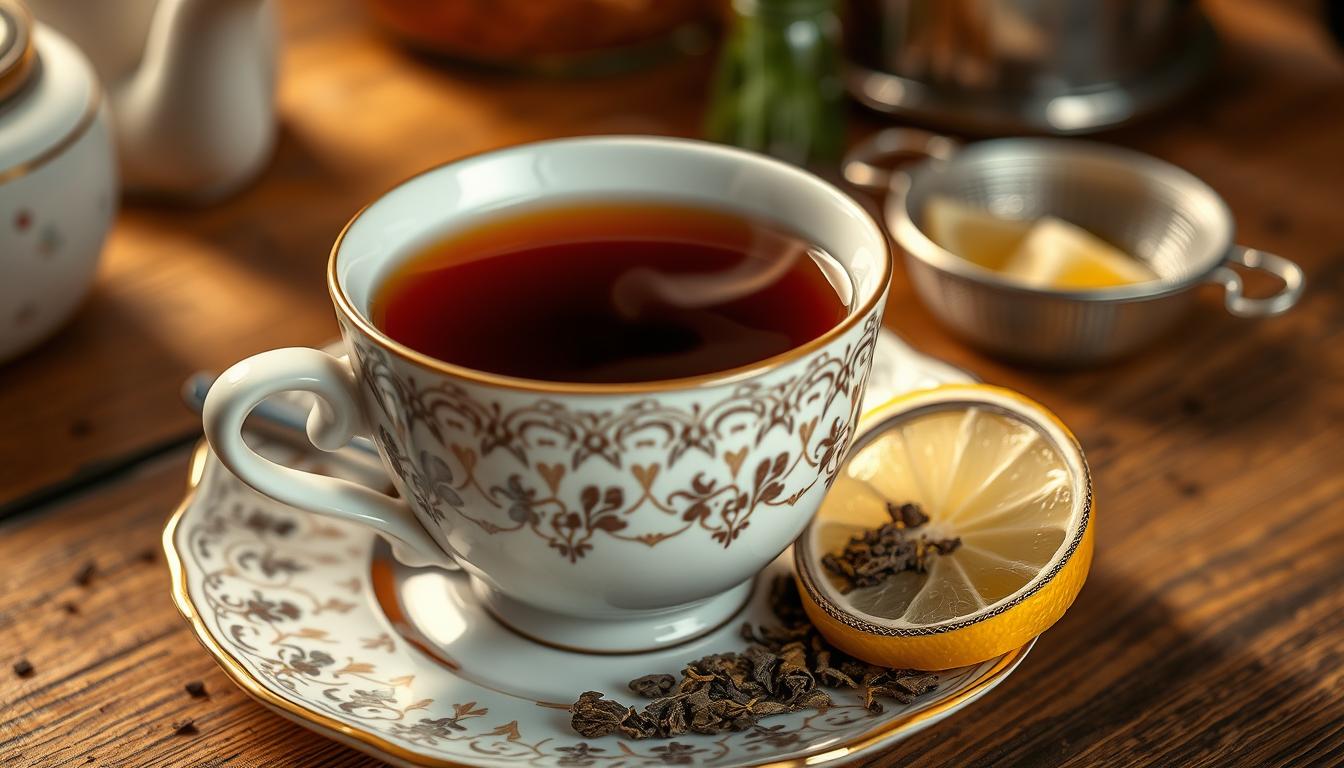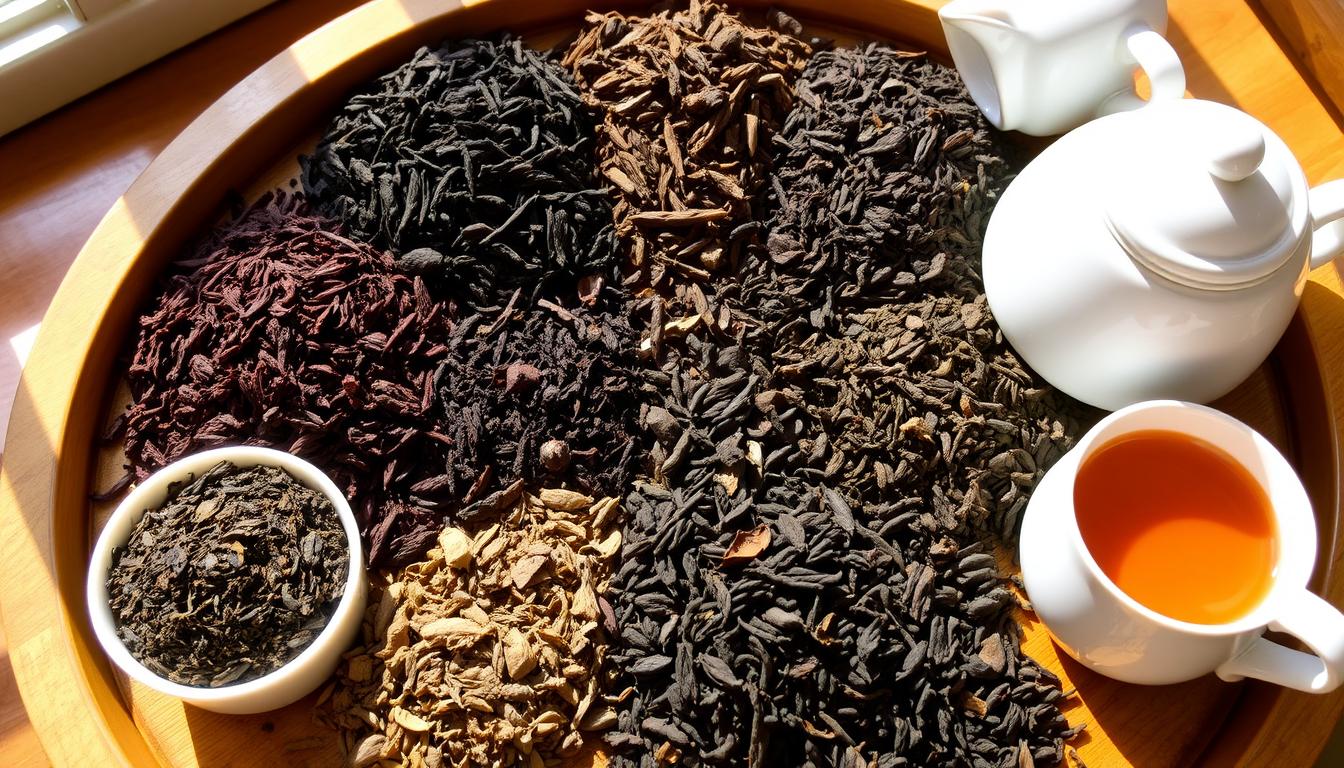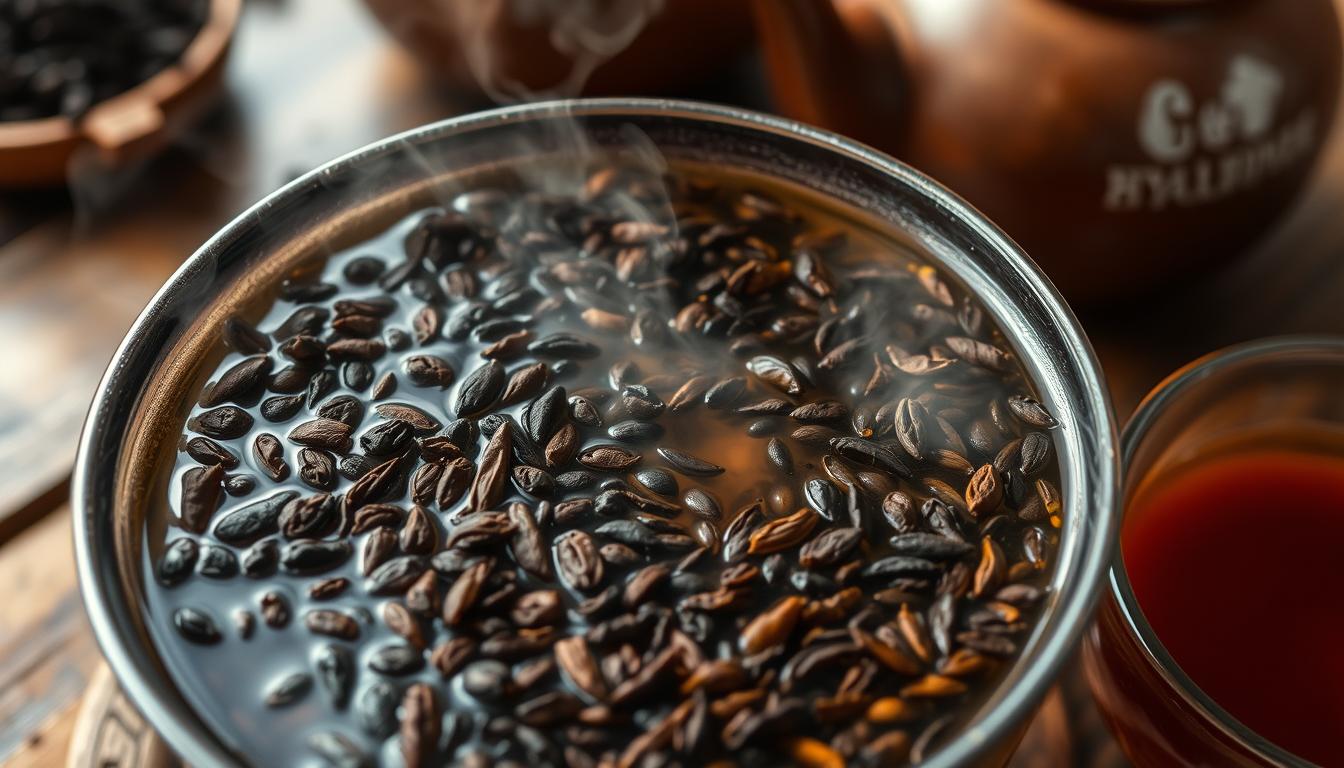Black tea brewing is an art that needs attention and practice. It has a rich flavor and health benefits, making it popular. We’ll show you how to brew the perfect black tea with different techniques.
We’ll cover everything from picking the right tea leaves to the perfect water temperature. This guide is for both beginners and experienced tea lovers. It will help you improve your brewing skills and enjoy your tea more.
Key Takeaways
- Mastering black tea brewing requires attention to detail and practice
- Using the right tea brewing techniques can enhance the flavor of your black tea
- Choosing the right tea leaves is crucial for a perfect cup of black tea
- Water temperature plays a significant role in black tea brewing
- Experimenting with different tea brewing techniques can help you find your perfect cup
- Black tea brewing is an art that can be perfected with patience and practice
- Our guide will provide you with the necessary skills to become a black tea brewing expert
Introduction to Black Tea Brewing
Black tea comes from the Camellia sinensis plant. It’s known for its strong taste and dark color. This is due to a fermentation process. Drinking black tea can help lower heart disease risk and boost brain function.
Brewing black tea is an art that needs focus. Choosing the right tea leaves and water temperature is key. Whether you’re new to black tea or a seasoned fan, knowing how to brew it is important.
Here are some key things for the perfect black tea:
- Tea quality: The quality of the leaves affects the tea’s flavor and smell.
- Water temperature: The best water temperature for black tea is between 200°F and 212°F.
- Steeping time: The steeping time varies by tea type and personal taste.
Understanding these factors and trying different brewing methods can enhance your black tea experience. With time and effort, you can make the perfect cup of black tea that you love.

Choosing the Right Black Tea
Choosing the right black tea can be tough with so many options. Fans of black tea often get lost in the sea of choices. Darjeeling, Assam, and Ceylon are just a few examples. Knowing what each type offers is key to making a good choice.
Deciding between loose leaf tea and tea bags is important. Loose leaf tea gives a richer taste and smell because the leaves can unfurl fully. Tea bags, however, are easier to use and can make a stronger tea.
Different Types of Black Tea
- Darjeeling: known for its light, floral flavor
- Assam: characterized by its strong, malty flavor
- Ceylon: offers a balanced, slightly sweet flavor
Your taste preferences should guide your choice of black tea. Think about the strength and taste you like. Try different types to find your favorite. Whether you choose loose leaf or tea bags, the secret to great black tea is quality ingredients and proper brewing.

The Essential Tools for Brewing Black Tea
Getting the right equipment is key to brewing the perfect black tea. The right tools can greatly improve the flavor and quality of your tea. Let’s look at the essential tools you need to start.
A good tea kettle is a must-have. Kettles with temperature control let you heat water to the perfect temperature for your black tea. This is important because different teas need different temperatures to bring out their flavors.
Teapots, Cups, and Infusers: What You Need
You’ll also need a teapot, cups, and an infuser. The teapot should keep heat well, like ceramic or glass. The cups should be comfy and big enough for your tea. An infuser is key for loose-leaf tea, keeping leaves out of your cup.
The Role of Tea Strainers and Filters
Tea strainers and filters are also crucial. They keep loose tea leaves out of your pot and cup. This is vital for teas with big or fragile leaves.
Investing in the right equipment, like kettles, teapots, cups, infusers, and strainers, ensures top-quality black tea. With practice, you can become a skilled tea brewer and enjoy perfect tea every time.
Water Quality and Temperature for Brewing Black Tea
When brewing the perfect black tea, water quality and temperature are key. Fresh, clean water is crucial for the taste and aroma. Impurities in the water can ruin the flavor and smell.
The right water temperature varies by tea type. Black tea needs water between 200°F and 212°F. Too hot or too cold water can spoil the brew. For instance, Darjeeling tea prefers 200°F, while Assam tea can handle up to 212°F.
To get the right temperature without a kettle, try a few methods. Let the water boil and then cool it for a minute or two. Or, use a thermometer to check the temperature. Paying attention to water quality and temperature can make your black tea better.
- Use fresh, clean water to prevent impurities from affecting the taste and aroma of the tea.
- Adjust the water temperature according to the type of black tea being brewed.
- Experiment with alternative methods to achieve the perfect water temperature without a kettle.
By focusing on water quality and temperature, you can improve your black tea brewing. Enjoying the nuances of this beloved drink becomes more rewarding.
Measuring Tea Leaves: Getting the Right Proportions
To brew the perfect cup of black tea, measuring the right amount of tea leaves is key. The tea-to-water ratio greatly impacts the flavor and strength. A good starting point is one teaspoon of loose-leaf tea or one tea bag for every 8 oz of water.
When measuring tea leaves, the type of tea matters. Stronger teas like Assam or Ceylon need less than weaker teas like Darjeeling. Here are some guidelines for measuring:
- Use 1-2 teaspoons of loose-leaf tea for a small cup (8 oz)
- Use 2-3 teaspoons of loose-leaf tea for a medium cup (12 oz)
- Use 3-4 teaspoons of loose-leaf tea for a large cup (16 oz)
Getting the tea-to-water ratio and tea leaf measurement right can greatly enhance your black tea’s flavor. Too little tea makes it weak, while too much can make it bitter.
By following these guidelines and experimenting, you can find the perfect balance for your taste. Enjoy a delicious cup of black tea.
| Tea Type | Tea Leaf Measurement | Tea-to-Water Ratio |
|---|---|---|
| Assam | 1-2 teaspoons | 1:8 |
| Darjeeling | 2-3 teaspoons | 1:10 |
| Ceylon | 1-2 teaspoons | 1:8 |
Brewing Time: Finding the Perfect Balance
When brewing black tea, steeping time is key. It can make or break your cup. The right brewing time depends on the tea type. Some teas need less time to avoid bitterness, while others require more to fully flavor.
Understanding how steeping time changes black tea taste is crucial. Longer brewing times mean stronger, bitter flavors. Shorter times result in lighter, more delicate tastes. Here are some general guidelines for different black teas:
- Darjeeling: 3-5 minutes
- Assam: 4-6 minutes
- Ceylon: 3-5 minutes
Be careful not to over-steep or under-steep. Over-steeping makes tea bitter and astringent. Under-steeping makes it weak and tasteless. Experimenting with steeping times helps find the perfect balance for your favorite tea.
Remember, the secret to perfect black tea is finding the right steeping time and brewing time. With practice and patience, you’ll enjoy a delicious cup every time.
Step-by-Step Guide to Brewing Black Tea
To brew the perfect cup of black tea, follow a few simple steps. This guide is for both beginners and tea lovers. It covers the basic steps to get you started.
First, pick your tea leaves and measure the right amount. Use one teaspoon of loose leaf tea for every eight ounces of water. Adjust this ratio to your taste. Next, heat the water to the ideal temperature, between 200°F and 212°F.
How to Brew Loose Leaf Black Tea for Maximum Flavor
For loose leaf black tea, use a teapot or infuser. This lets the leaves unfurl and release their flavor. Steep the tea for 3-5 minutes, depending on the tea type and your taste. You can add milk, sugar, or other flavorings to enhance the taste.
The Best Method for Brewing Black Tea in a Teapot
Brewing black tea in a teapot is classic. It produces a rich flavor. Use one teaspoon of loose leaf tea per eight ounces of water and steep for 3-5 minutes. Tea bags are also an option if you prefer.
| Tea Type | Steeping Time | Water Temperature |
|---|---|---|
| Assam | 3-5 minutes | 200°F – 212°F |
| Darjeeling | 2-3 minutes | 190°F – 200°F |
| Ceylon | 3-5 minutes | 200°F – 212°F |
By following these steps and using the right brewing guide, you can enjoy perfect black tea every time. Try different brewing techniques to find your favorite flavor and aroma.
Enhancing the Flavor of Your Black Tea
Black tea is a versatile drink that can be enjoyed alone or with additives. Sweeteners, milk, and lemon can enhance its flavor. These additions create a unique and tasty experience.
There are many ways to add flavor to black tea. Honey, sugar, and creamer are popular choices. Tea additives like these make the tea smooth and perfect for any time. For a spicy twist, try cinnamon or cardamom. They add warmth and aroma, ideal for cold days.
Other than sweeteners and spices, there are many more ways to flavor black tea. Here are a few:
- Lemon or lime juice for a burst of citrus flavor
- Vanilla or almond extract for a sweet and creamy flavor
- Ginger or peppermint for a spicy and refreshing flavor
These are just a few examples of how to enhance black tea’s flavor. By trying different additives, you can find the perfect taste for you.
Common Mistakes to Avoid When Brewing Black Tea
Even tea lovers can make mistakes when brewing black tea. To get the perfect cup, knowing common mistakes is key. Common mistakes can make your tea taste bad, either too bitter or too weak.
Some common brewing mistakes include using boiling water, steeping too long, and not using the right tea amount. These errors can be fixed by following simple rules. For example, the right water temperature greatly affects the tea’s taste.
Here are some tips to help you avoid common mistakes:
- Use fresh, high-quality tea leaves
- Heat water to the right temperature (between 200°F and 212°F)
- Steep the tea for the recommended amount of time (usually between 3 and 5 minutes)
- Use the right tea-to-water ratio (usually 1 teaspoon of loose-leaf tea per 8 oz of water)
By following these tips and being careful, you can make the perfect black tea every time. Remember, it takes practice to get it right. So, don’t worry if it takes a few tries.
Troubleshooting Your Black Tea
Even with the best plans, black tea can sometimes go wrong. This is where troubleshooting helps. It lets you find and fix common problems that can mess up your tea’s taste and quality. If your black tea tastes too bitter or weak, there are ways to make it better.
Keeping your tea leaves right is key. Good storage keeps the flavor and smell of your tea fresh. Bad storage can make your tea taste stale or bitter. To fix your black tea, first check how you store it and make changes if needed.
Some common black tea problems include:
- Over-steeping, which can make it taste bitter
- Under-steeping, which can make it taste weak or bland
- Using water that’s too hot or too cold
- Not using the right amount of tea leaves
To solve these problems, try changing your steeping time, water temperature, or tea leaf amount. You can also try different storage methods, like using an airtight container or a cool, dry spot.
By following these tips and troubleshooting your black tea, you can enjoy a better-tasting brew. Always store your tea leaves properly and tweak your brewing methods to get the best flavor from your black tea.
| Issue | Solution |
|---|---|
| Bitter taste | Adjust steeping time or use less tea leaves |
| Weak taste | Use more tea leaves or steep for a longer time |
| Stale taste | Check storage methods and adjust as needed |
Conclusion
Making the perfect cup of black tea is an art that needs time and practice. This guide has shown you how to get it right. It’s all about knowing your tea, the water, and how to brew it. With patience and a bit of experimentation, you can enjoy this ancient drink to the fullest.
Why Practice Makes Perfect with Black Tea
Just like any skill, getting better at brewing black tea takes practice. Paying attention to things like water temperature and steeping time helps. This trial and error is what makes enjoying black tea so special.
Enjoying the Full Experience: Brewing, Tasting, and Savoring Black Tea
The real joy of black tea is in the whole experience. Take time to smell the aroma, look at the color, and notice how the flavors change. Enjoy each cup as a chance to slow down and appreciate the moment. This mindful way will make you love black tea even more.
Making Black Tea a Daily Ritual for Health and Enjoyment
Black tea is not just tasty; it’s also good for you. Adding it to your daily routine can boost your health. It’s a simple way to care for your body and soul.

